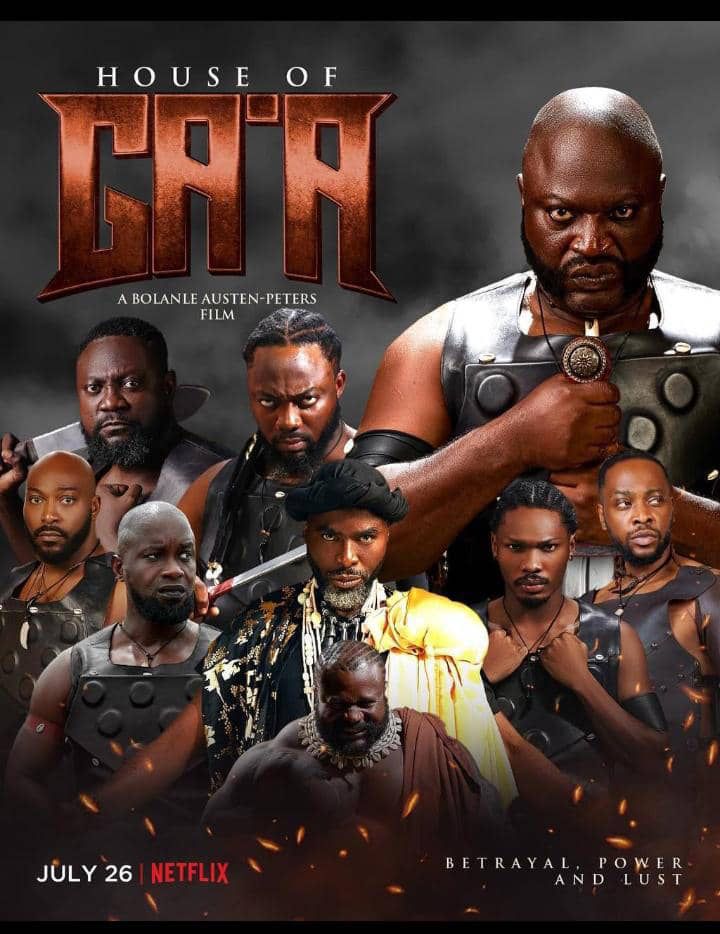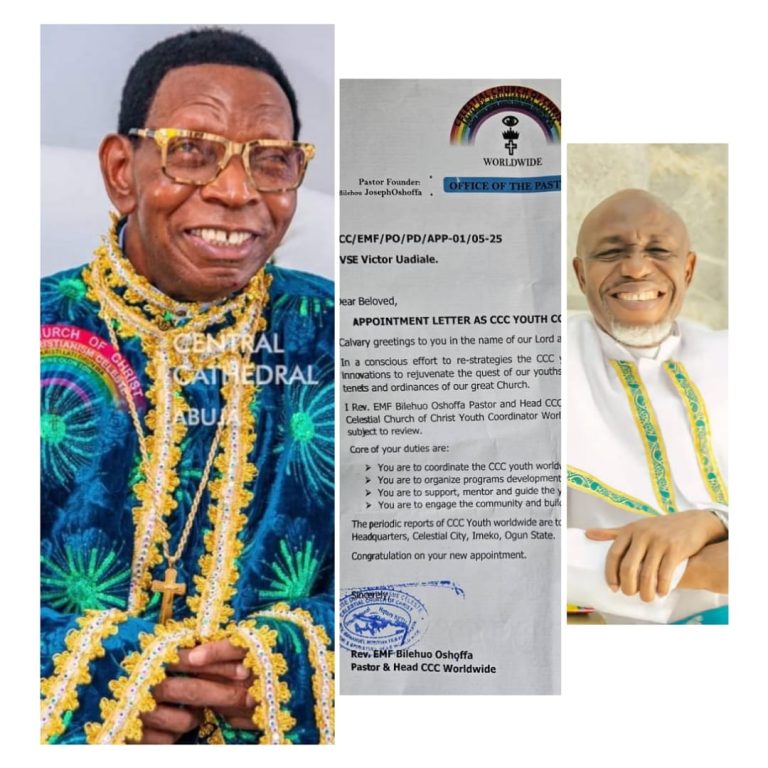By Amadi Chimaobi Kingsley
AMID Netflix’s recent collection of Yoruba films, like ‘Ajakaju: Beast of Two Worlds ‘, “House of Ga’a” is an unforgettable epic.
The story of Bashorun Ga’a is a famous Yoruba real-life story of an Oyo-Ile tyrant but sadly this adaptation wasn’t so as Lagos yoruba accent was heard from most of the new generation actors amongst other flaws.
Adebayo Faleti wrote the novel Basorun Gaa, which the writer adapted for the stage and performed in 2010 by students. In 2004, Faleti shot a movie based on the story.
Netflix’s House of Ga’a is a captivating tale that entertains while delivering a didactic lesson. It is worthy of emulation for its excellent delivery, brilliant storytelling with an unsatisfying ending.
The movie begins with a gripping war scene between the Nupe and the Yoruba kingdom. In this scene, you would expect blood and battle scars but sadly the first and last scene which started and ended with a war scene was clean with a little of orange color stain at the tip, impact the war scene had the fruit/food table intact …no blood stains on it or the table in disarray.
Ga’a and his sons lead the Old Oyo Empire to victory regardless of the Nupe defense, which was poor, earning Ga’a the title of Bashorun of Oyo.
Ga’a’s son, Oyemekun, was sent to Dahomey to be trained as a warrior. After the death of Gaa, Dahomey gained independence, and nothing was said about this in the movie.
Oyemekun is twice scorned by his father. Firstly, when his father orders the marriage of his sweetheart, Agbonyin (Bridget Nkem), to his uncle. Upon his uncle’s death and the appointment of Agbonyin’s father, Abiodun, as Alaafin Majeogbe’s successor, Oyemekun hopes to finally take his beloved as wife, but Ga’a has other plans. His actions twist Oyemekun into a ball of bitterness, pitting him against his father who has also inspired the wrath of Abiodun (Adeniyi Johnson) and the rest of the Kingdom.
Gaa finally killed Agbonyin for his selfish reason which triggered Oyemekun to kill Gaa’s herbalists and caused the wrath of Alaafin Abiodun.
After the war, Ga’a chooses a Nupe enslaved person, Zainab, as one of his servants, eventually making her his wife, the nude scene that followed suit was displeasing to the eyes but I guess ratings has to be made even if one could tell it was fake, back to the story this displeases his other wives and they made sure their displeasure was felt by the Bashorun’s new favorite.
He appoints his brother Olokoye as the governor of Ibadan and his first son Olaotan as the governor of Dahomey and sends his other sons to govern Egbaland and Ilorin. However, he gives nothing to his younger brother Olubu, considering him a drunk and a family disgrace. Olubu tried to rape Princess Agbonyin which led her marriage to the Olukoyi of Ibadan.
Meanwhile, as Bashorun, Ga’a remembers how the Alaafin, when he was a crown prince, beat his older brother Oluke to death. This flash back further confused we the viewers as it was seen irrelevant as to why Gaa was out for the Alaafins of Oyo ile.
Ga’a’s resentment towards the Alaafin grows, leading him to conspire with the Oyomesi against any non-submissive Alaafins. This continues until Majeogbe becomes Alaafin. Majeogbe, aware of Ga’a’s tricks, protects himself with charms and is determined to end Ga’a’s authoritarian rule.
Ga’a considers himself the most powerful man in the kingdom, refusing to bow even to the emperor. Fearful noblemen allowed Ga’a to select the Alaafin, ensuring a ruler who would respect him and not demand his obedience. He had already dethroned 3kings.
Majeogbe’s reign is marked by his efforts to stop Ga’a’s violence. At the wedding of Olokoye and Princess Agbonyin, Majeogbe proposes a one-on-one sword fight between his best warrior and Ga’a’s best warrior. Olaotan accepts the challenge, but Majeogbe insists that Oyemekun, who is less experienced, fight instead.
A great part of the movie’s momentum is built by setting up specific characters. There is Zeinab, Oyemekun, and even Ga’a’s brother, the one played by Lateef Adedimeji. They are all placed on the board as players to be closely watched. Zeinab (Tosin Adeyemi) is a captured slave who eventually becomes Ga’a’s wife and surprising she denialed him at sword point. We also spend a great part of the story watching Oyemekun grow into a capable warrior that could not defend his father in the end.
And there is the black sheep brother who also meet his untimely death after betraying his brother Gaa, whose contant falling out with Ga’a teases an imminent recoil. Their characterizations are matched and bolstered by the creeping feeling that something big would eventually happen to Ga’a’s household; and while something big does happen, Ga’a’s demise leaves the tension hanging by failing to follow through with the buildup of Oyemekun’s arc and failing to establish the significance of Zeinab’s character. She rises to prominence as Ga’a’s wife, only to remain irrelevant in the grand scheme. When the household is about to be toppled, she does nothing that fulfills a character’s narrative journey.
As for Oyemekun, his character could be described as the most disappointing part of the movie’s plot. History says it was o ly Gaa’s first son that escaped but the movie says it the last son with only an arrow wound,he found solace in ilorin.
Ga’a is the center of the story, the protagonist. However, Oyemekun is framed as the movie’s hero. All through the film you would find yourself waiting for his awakening, only to realize that he would end up doing nothing of any real effect. The failure of the plot to tie up Oyemekun’s build up in a climactic finish lays waste to the pressure that the movie’s pacing had been mounting on the character since the beginning of the film, it was disappointing to note.
The ending of House of Ga’a would have been a satisfying finish if not for the seamlessness of it. Ga’a’s fate was on a downward spiral right from the beginning of the movie when the power started to get to his head. However, just like Oyemekun, his character is built up too high only to be done away without much fuss. Ga’a’s tragic flaw ends up taking too much of the spotlight and eventually overshadows other aspects of his character, namely his experience, strength, and battle acumen. While he is weakened and caught by surprise, it is hard to watch his house crumble without entertaining the thought that the final showdown occurs too easily. Ga’a’s unsatisfying but poetically justified end is only made worse by the fact that we are never really taken through convincing circumstances that led to his villainy.
I was expecting the movie to further show us the impact of his death on the Oyo Empire, but we only got a fake fire scene that ends it.
In a nutshell, House of Ga’a, a historical Yoruba language film, is one that is defined by great acting, electric atmosphere, and ultimately undercooked characters. Judging from the star-studded cast, the numerous plot lines, the artistic performances, and the bold exploration of Yoruba royalty and culture, House of Ga’a is a movie that sets out to make a mark in different departments. While it does succeed in achieving some of this, it loses its grip on the plot’s momentum and characterization. As the end credits roll, you are left with a new feeling —That might have been one heck of a story, but it felt like an incomplete tale.













Leave a Reply